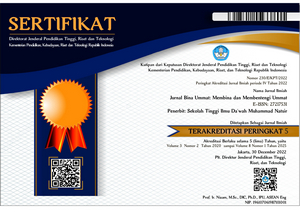PANDANGAN MOHAMMAD NATSIR TERHADAP DA’WAH IHYA’ AS SUNNAH
DOI:
https://doi.org/10.38214/jurnalbinaummatstidnatsir.v2i02.48Keywords:
Mohammad Natsir, da’wah, ihya as sunnahAbstract
Untuk mengetahui pandangan Mohammad Natsir terhadap da’wah ihya’ As Sunnah. Metode Penelitian: Kualitatif. Hasil Penelitian: Natsir tampil sebagai tokoh modernis yang tampil progresif tanpa harus menjadi sekuler. Hal itu sebagaimana yang ia pesankan; ”Seseorang tidak perlu menjadi seorang sekuler terlebih dahulu untuk kemudian menjadi orang progresif atau orang modern.”[1] Ia menggunakan akal untuk mendobrak kejumudan berfikir tanpa harus menjadi kafir oleh sebab kemerdekaan berfikirnya yang melampaui batas. Pemahamannya terhadap agama baik menyangkut bidang akidah, ibadah dan akhlaq bahkan bidang-bidang lain dapat diambil benang merahnya dalam pemahaman Islam modernis yang memperjuangkan pemurnian agama. Ia mengamalkan sunnah Nabi, menda’wahkannya, dan menjaganya hingga akhir hayat. Semoga sunnah hasanah yang ditinggalkan menjadi jariyah disisinya.
Published
Versions
- 2019-12-20 (2)
- 2020-06-25 (1)
Issue
Section
This work is licensed under a Lisensi Creative Commons Atribusi 4.0 Internasional.
Authors who publish with this journal agree to the following terms:
- Authors retain copyright and grant the journal right of first publication with the work simultaneously licensed under a Creative Commons Attribution License that allows others to share the work with an acknowledgment of the work's authorship and initial publication in this journal.
- Authors are able to enter into separate, additional contractual arrangements for the non-exclusive distribution of the journal's published version of the work (e.g., post it to an institutional repository or publish it in a book), with an acknowledgment of its initial publication in this journal.
- Authors are permitted and encouraged to post their work online (e.g., in institutional repositories or on their website) prior to and during the submission process, as it can lead to productive exchanges, as well as earlier and greater citation of published work (See The Effect of Open Access).




